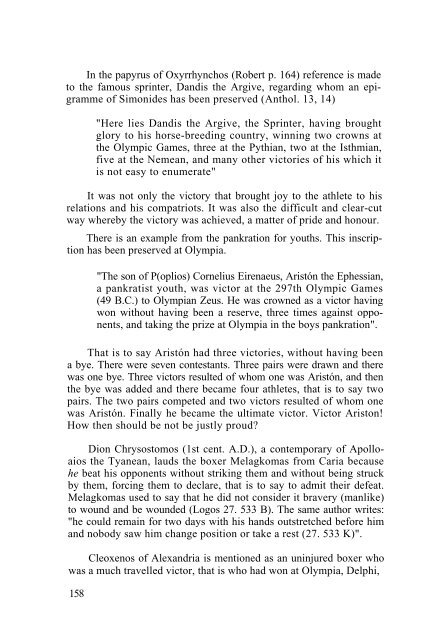download - IOA
download - IOA
download - IOA
You also want an ePaper? Increase the reach of your titles
YUMPU automatically turns print PDFs into web optimized ePapers that Google loves.
In the papyrus of Oxyrrhynchos (Robert p. 164) reference is made<br />
to the famous sprinter, Dandis the Argive, regarding whom an epigramme<br />
of Simonides has been preserved (Anthol. 13, 14)<br />
"Here lies Dandis the Argive, the Sprinter, having brought<br />
glory to his horse-breeding country, winning two crowns at<br />
the Olympic Games, three at the Pythian, two at the Isthmian,<br />
five at the Nemean, and many other victories of his which it<br />
is not easy to enumerate"<br />
It was not only the victory that brought joy to the athlete to his<br />
relations and his compatriots. It was also the difficult and clear-cut<br />
way whereby the victory was achieved, a matter of pride and honour.<br />
There is an example from the pankration for youths. This inscription<br />
has been preserved at Olympia.<br />
"The son of P(oplios) Cornelius Eirenaeus, Aristón the Ephessian,<br />
a pankratist youth, was victor at the 297th Olympic Games<br />
(49 B.C.) to Olympian Zeus. He was crowned as a victor having<br />
won without having been a reserve, three times against opponents,<br />
and taking the prize at Olympia in the boys pankration".<br />
That is to say Aristón had three victories, without having been<br />
a bye. There were seven contestants. Three pairs were drawn and there<br />
was one bye. Three victors resulted of whom one was Aristón, and then<br />
the bye was added and there became four athletes, that is to say two<br />
pairs. The two pairs competed and two victors resulted of whom one<br />
was Aristón. Finally he became the ultimate victor. Victor Ariston!<br />
How then should be not be justly proud?<br />
Dion Chrysostomos (1st cent. A.D.), a contemporary of Apolloaios<br />
the Tyanean, lauds the boxer Melagkomas from Caria because<br />
he beat his opponents without striking them and without being struck<br />
by them, forcing them to declare, that is to say to admit their defeat.<br />
Melagkomas used to say that he did not consider it bravery (manlike)<br />
to wound and be wounded (Logos 27. 533 B). The same author writes:<br />
"he could remain for two days with his hands outstretched before him<br />
and nobody saw him change position or take a rest (27. 533 K)".<br />
Cleoxenos of Alexandria is mentioned as an uninjured boxer who<br />
was a much travelled victor, that is who had won at Olympia, Delphi,<br />
158

















